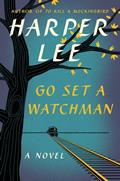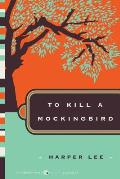

Like so many people, I have read To Kill a Mockingbird many times and loved it. While I was eager to read Go Set a Watchman, I was also a little trepidatious after reading a few strong, negative reviews.
These reviews brought up questions for me...How can any second book live up to such an amazing first book, especially if it is following the same main characters? What about the racial issues that some reviewers brought up? Is Atticus really a racist? Can it be so?
In To Kill a Mockingbird, Atticus is a small town lawyer, widower and father of two young children, standing on justice to defend a black man unjustly accused of raping a white woman. To Kill a Mockingbird is a morality tale, letting us know that fighting for what is right, even against incredible odds, is important. In To Kill a Mockingbird we love and respect Atticus for his strength and firm moral conviction.
His firm moral conviction against racism and prejudice, right?
Well...
Go Set a Watchman begins with Scout coming home to Maycomb County as an adult, just as the Supreme Court has ruled on Brown vs the Board of Education in 1954. Scout (Jean Louise), finds out that most of the people in her town, including Atticus, are not supportive of this ruling. Is it possible that Atticus Finch supports segregation?
This is not the Atticus we remembered.
This is not the Atticus that Jean Louise remembered either. Jean Louise revered Atticus. Yet here he is, supporting segregation. In Go Set a Watchman, Jean Louise struggles to understand how Atticus can disagree with this Supreme Court ruling and how he can believe what he does about race. She feels as though her world is being upended.
What is going on here?
Jean Louise is growing up.
Jean Louise is growing out of simplistic ways of thinking and discovering how complex people and issues are. She changes from thinking that Atticus is all-seeing, all-knowing, and infallible, into realizing that he is human and that he has flaws. Throughout Go Set a Watchman, Jean Louise has to reconcile how she rememebered people from her childhood with the realities of how these same people are behaving in her present day. They aren't different people, she is just seeing them through more mature eyes.
I got more depth and insight into these characters than I did in To Kill a Mockingbird. When I read To Kill a Mockingbird, I, like Scout, saw Atticus as a paragon of justice and racial equality. It was an interesting experience to have loved and revered a fictional character so much and to notice how upset I was as I read Go Set a Watchman to discover how different Atticus was than I wanted him to be. Perhaps Go Set a Watchman is not a coming of age story just for Jean Louise. Perhaps it is one for us as well.
Well done.
Thanks for stopping by! If you haven't already gotten a copy of Go Set a Watchman, you can click on the book cover and get it from Powell's City of Books. Be sure and check out our Facebook page here: NOT The New York Times Book Review. You can also send us email using this address: 2of3Rs(AT)gmail(DOT)com.